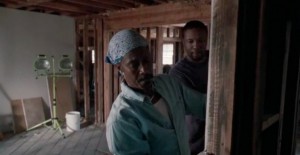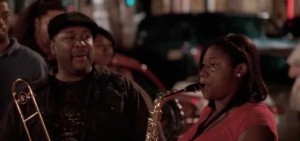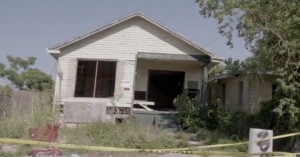You Have Friends That Want You Back Home
 Sunday’s airing of Treme‘s season hour-and-a-half season finale did its best to tie up a season’s worth of loose ends. LaDonna got a couple strong kicks in on her rapist and her husband finally realized what her family’s bar and New Orleans means to her; Davis finally came to the conclusion that he is a music lover but not much of a musician; Sofia and Toni found a new sense of happiness in their daughter/mother relationship; Antoine lost one band and helped form another, more meaningful one; Colson openly admitted that the entire homicide department needs to cleaned out by the Feds; Nelson realized that his ambitions have limits and that he has been played by Liguori as a minority pawn in a long-term struggle for real estate; Janette is offered a chance to come home with investors ready to back a new restaurant; Delmond’s success working with his father on the Mardis Gras Indian/Jazz project has made him feel closer to both the father and hometown he has spent most of his life escaping; and even Sonny, Treme‘s resident in-recovery junkie, might have a brighter, clearer path and a new love.
Sunday’s airing of Treme‘s season hour-and-a-half season finale did its best to tie up a season’s worth of loose ends. LaDonna got a couple strong kicks in on her rapist and her husband finally realized what her family’s bar and New Orleans means to her; Davis finally came to the conclusion that he is a music lover but not much of a musician; Sofia and Toni found a new sense of happiness in their daughter/mother relationship; Antoine lost one band and helped form another, more meaningful one; Colson openly admitted that the entire homicide department needs to cleaned out by the Feds; Nelson realized that his ambitions have limits and that he has been played by Liguori as a minority pawn in a long-term struggle for real estate; Janette is offered a chance to come home with investors ready to back a new restaurant; Delmond’s success working with his father on the Mardis Gras Indian/Jazz project has made him feel closer to both the father and hometown he has spent most of his life escaping; and even Sonny, Treme‘s resident in-recovery junkie, might have a brighter, clearer path and a new love.
Which may be more than one can say for New Orleans. As Treme’s second season offers its characters some sense of closure over the traumas of Katrina, the montage of New Orleans abandoned buildings, neighborhoods and crime at the end of Sunday’s program remind the viewer that New Orleans still doesn’t have the services and infrastructure necessary for its citizens’ safety and well being. As Davis spins Louis Armstrong’s “Wrap Your Troubles Up in Dreams” while he, once again, DJs for WWOZ, the shots of vacant lots, abandoned buildings and street crime remind the viewer that whatever resolution these characters find, the city is replete with less-than-happy endings. If anything, Davis’ silence and sucker-punch reaction to the end of Armstrong’s ballad reminds him and the viewer that the road for New Orleans’ recovery will be long and littered with the difficulties and struggles of a population that simply feels out of place anywhere else in America. Davis laments that “even if they make it hard where else would we go? Who else would have us?” sums up the conundrum that America’s greatest cultural treasure poses its residents two years after the water swallowed the city and the Federal government somehow forgot how to care.
David Simon makes his cities pose questions. They are his program’s main characters and their larger political economic problems of labor, services and wealth are never placed in the background. Simon often referred to The Wire’s portrayal of Baltimore as a kind of televised sociology. Treme, on the other hand, yens for musicological lenses and kitchen studies. If The Wire focused on a city’s lack of infrastructural resources and the impacts this had on its citizens, Treme has emphasized on the many skills, labors and laborers it takes to make New Orleans sing. Treme’s focus on how its culture and cultural economies are created and presented through music and cuisine has meant a majority of its almost 22 narrative hours watching musicians struggle with bar owners, the recording business, the law and each other. And for every rehearsal scene and onstage argument, we are provided a back-of-the-house moment portraying of both the pleasures and horrors of the professional kitchen.
The connections between the pleasures of the table and those of the ear are many. Temporal arts of the senses, food and music are intertwined because of their mutual investment in experiential economies that do not travel well. That Delmond and Janette strike up a friendship as NOLA exiles in NYC in the second season is only logical. The two are both skilled artists that spend the season weaving their way back and forth from New Orleans as they tend to the needs of friends and family. Yet it’s more than that as both Janette and Delmond are trying to process what New Orleans means to them as people and, more importantly, their arts and artistry. Delmond’s recording projects and Janette’s dishes are grounded in New Orleans traditions, but without being grounded in New Orleans the two come to understand that while they succeed in New York they exist in the city at a significant loss. Their call back to New Orleans is not so much laced with the temptations of “opportunity”, but the need rebuild their home. As Janette, is told by her potential investor, “You have friends that want you back home”. These first two seasons of Treme have depicted this process of a unique labor force returning to a city that throughout history has thumbed its nose at change but has been forced to by the forces of nature. Yet as Big Chief Albert Lambreaux reminds earlier in season two when he explains to the filmmaker who wants to film the process him sewing his Mardis Gras Indian suit, “The Process don’t matter if you don’t have no result. Process, shit. The process… is just a lot of damn hard work.”
 If there is hope to be found in Treme that all of this work will have a fruitful result it is in Antoine’s teaching and mentoring of young musicians in both the schools and on the streets. In particular, Antoine has taken one teen trumpeter named Robert under his tutelage. Robert appears in the very first scene of the second season playing the first five notes of “When The Saints Go Marching In” over and over as a sort of musical seed that, with proper nurturing and attention, may mature into a whole song, a whole set. Under Antoine’s guidance, Robert’s hard work is rewarded as he and his bandmates present their first public performance on a street in the French Quarter during Jazz Fest. Chaperoned by Antoine, the performance is the culmination of hope, hope which is the result of developed embouchures, many sour notes and broken rhythms. This is the hard, important preparatory work needed to make both the legendary local music and cuisine of the Crescent City. Neither of these are a given, but the sweet fruit of cultural work that elevates this labor at the expense of other items and services. Indeed, In one of the more important academic studies on popular music in the 20th century, Sociologist Ruth Finnegan notes that when she started to write about local music in Milton Keynes, “At first, I just took this local music for granted and, beyond a vague expectation that the necessary arrangements would just be there for me and mine, did not think much about it” (Finnegan, p. xvii). The two seasons of Treme remind us that although these arts may be New Orleans’ birthright and the foundation of their tourist economy, they are dependent on human traditions, people and cultures, all of which can be washed away and in need of homes.
If there is hope to be found in Treme that all of this work will have a fruitful result it is in Antoine’s teaching and mentoring of young musicians in both the schools and on the streets. In particular, Antoine has taken one teen trumpeter named Robert under his tutelage. Robert appears in the very first scene of the second season playing the first five notes of “When The Saints Go Marching In” over and over as a sort of musical seed that, with proper nurturing and attention, may mature into a whole song, a whole set. Under Antoine’s guidance, Robert’s hard work is rewarded as he and his bandmates present their first public performance on a street in the French Quarter during Jazz Fest. Chaperoned by Antoine, the performance is the culmination of hope, hope which is the result of developed embouchures, many sour notes and broken rhythms. This is the hard, important preparatory work needed to make both the legendary local music and cuisine of the Crescent City. Neither of these are a given, but the sweet fruit of cultural work that elevates this labor at the expense of other items and services. Indeed, In one of the more important academic studies on popular music in the 20th century, Sociologist Ruth Finnegan notes that when she started to write about local music in Milton Keynes, “At first, I just took this local music for granted and, beyond a vague expectation that the necessary arrangements would just be there for me and mine, did not think much about it” (Finnegan, p. xvii). The two seasons of Treme remind us that although these arts may be New Orleans’ birthright and the foundation of their tourist economy, they are dependent on human traditions, people and cultures, all of which can be washed away and in need of homes.
Works Cited
Finnegan, R. (2007). The Hidden Musicians: Music-Making in an English Town (Reprint ed.). Middletown, CT: Wesleyan University Press.



